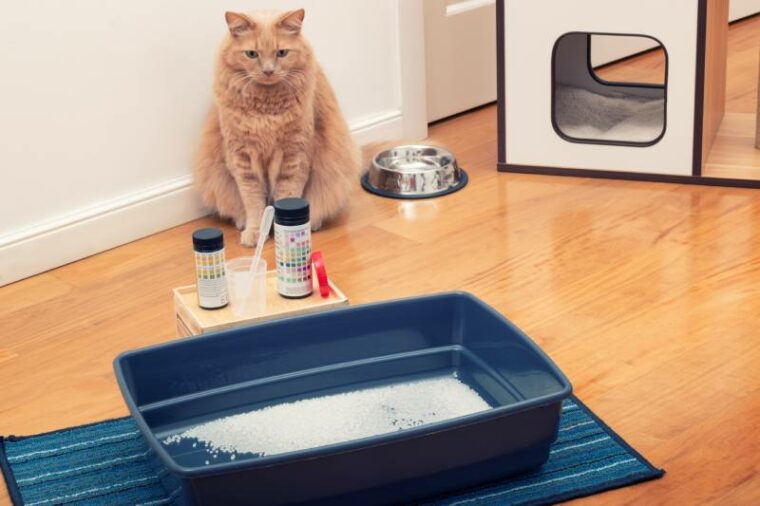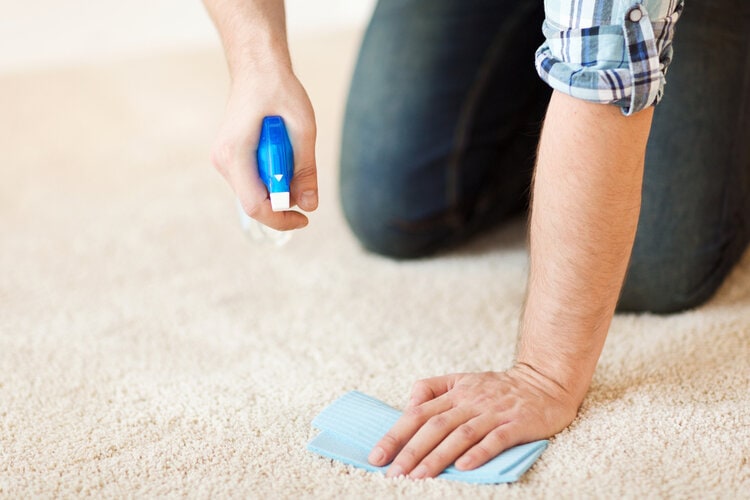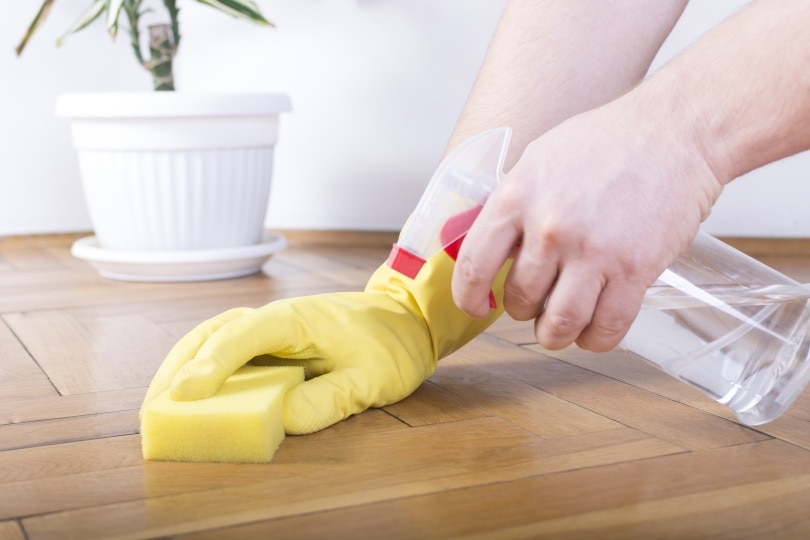
Click to Skip Ahead
Cat urine odor can be stubborn and unpleasant, especially in the basement, where it can linger indefinitely due to the damp, stagnant air. While getting your basement to smell fresh can be challenging, it’s not impossible. Keep reading for an easy-to-follow guide filled with tips and tricks that will help eliminate bad urine smells once and for all.
Before You Begin
It’s important to gather your supplies so you won’t need to stop once you get started. You might already have most of the items that you need, but they’re all relatively easy to find and inexpensive.
How to Get Rid of Cat Urine Smells in a Basement
1. Identify the Source
The first step in eliminating cat urine smells in your basement is to locate the source of the odor. Cats may urinate in various areas, including corners, behind furniture, or on carpets. Inspect your basement thoroughly, using your nose to pinpoint the strongest odor. To detect hidden urine stains, consider using a black light. Cat urine will fluoresce under ultraviolet light, making it easier to identify affected areas. It will also help ensure that you get the area completely clean.
2. Blot and Remove Excess Urine
Once you have identified the urine stains using your nose and a black light, wear protective gloves, and use paper towels to blot up as much urine as possible if you find any puddles on hard surfaces.

3. Mix the Cleaning Solution
If the urine is on a hard surface, you can use a cleaning agent to remove it. Many different brands are available, but we recommend an enzyme-based cleaner because it works by destroying the organic material that is creating the odor, so it’s gone forever. Mix the cleaner that you choose with warm water according to the directions on the package.
If you're trying to find an enzyme cleaner that does it all, we highly recommend our favorite cleaner, the Hepper Advanced Bio-Enzyme Pet Stain & Odor Eliminator Spray.
It permanently removes the very worst stains and smells you can imagine and makes clean up a breeze. There's even a 100% satisfaction guarantee! Click here to order a bottle today.
At Pet Keen, we’ve admired Hepper for many years, and decided to take a controlling ownership interest so that we could benefit from the outstanding products of this cool cat company!
4. Scrub the Area
Scrub the affected area thoroughly using a scrub brush or a durable sponge. You typically let the solution set for a short time so the enzymes can do their work.

5. Rinse the Area
Rinse the area with clean water, and dry it with a towel or paper towel.
6. Blot and Absorb Excess Urine
If the urine is on a porous surface, like a carpet, you may be able to blot the area with a paper towel to soak up the urine.

7. Apply Cleaning Solution
Apply your enzyme cleaner, following the instructions for porous surfaces on the container. Allow it to soak for the recommended time to destroy the organic material creating the bad odor.
8. Rinse and Extract
After soaking, rinse the area with clean water, and use a wet vacuum or extractor to remove excess moisture and cleaning solution to get it as dry as possible.

9. Dry and Deodorize
Allow plenty of time for the area to dry completely, whether you are working on a hard or porous surface. Then, apply a pet-safe odor neutralizer to help freshen up the area. Many brands are available, so take time to find something that you like.
10. Repeat If Necessary
Stubborn odors may require multiple cleaning sessions. Be patient and persistent and repeat the previous steps until you have successfully eliminated the urine smell.

Tips for Minimizing Odors

Tips for Preventing Future Odors
Frequently Asked Questions
Why Does Cat Urine Smell Linger in a Basement?
Cat urine odors can linger in basements due to poor ventilation, high humidity levels, and the porous nature of many basement materials that trap and hold odors.
Can I Use Bleach to Remove Cat Urine Odors from My Basement?
We recommend avoiding bleach because it can react with the ammonia in cat urine and create harmful fumes. Enzymatic cleaners are safer and more effective.
Can I Use Ammonia to Remove Cat Urine Odors from My Basement?
Cat urine contains ammonia, so using it can make the odor stronger and might even attract other cats to the same spot.
Are There Any Natural Remedies for Removing Cat Urine Smells in a Basement?
Vinegar and baking soda are natural remedies that can help neutralize general odors and might even work for cat urine odors. However, enzymatic cleaners are often more effective.
When Should I Consider Seeking Professional Help?
If the smell persists despite your best efforts or if you suspect that the urine has penetrated structural components, it may be time to consult a professional odor removal service or contractor.
Summary
Eliminating cat urine smells from your basement is best accomplished by locating the urine stains, often with a blacklight, and then using paper towels to dry any puddles before applying an enzyme-based cleaner that will destroy the organic material in the urine, eliminating the odor. Also, increasing ventilation with a fan or opening windows and decreasing humidity with a dehumidifier will prevent odors from getting too strong.
Featured Image Credit: Yaya Photos, Shutterstock








